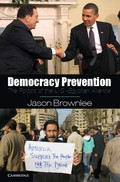3 - The Succession Problem
Published online by Cambridge University Press: 05 November 2012
Summary
Paradoxically, September 11, 2001, brought new urgency to security cooperation between Washington and Cairo and brought democracy to the fore of official discourse. George W. Bush believed that the attacks, which killed nearly three thousand people on U.S. soil, necessitated Washington revisit its relations with Arab autocrats. This rethink, however, did not alter the United States’ basic approach to the Egyptian regime. Although it sometimes appeared Bush was at loggerheads with Mubarak, their biggest disagreements concerned U.S. regional policies, not internal Egyptian politics: Mubarak had misgivings about the U.S.-led invasions of Afghanistan and Iraq, while Bush balked at Mubarak's call for direct Arab-Israeli peace talks. Nonetheless, joint covert operations expanded – even as Bush publicly enjoined Mubarak to liberalize and Mubarak slammed Bush's approach to the Palestinians and Iraq. Compared to the presidents’ substantial arguments about the United States’ role in the Middle East, their disagreements about democracy promotion in Egypt were tactical, concerning different ways of reaching the shared goal of regime continuity. Whereas Mubarak wanted to groom his son for the presidency, Bush's advisors favored a more seasoned and reliable successor, such as Omar Suleiman.
This chapter revises the dominant narrative about the Bush administration's Freedom Agenda. Observers have widely billed and accepted Bush's democracy promotion policies as a strategic watershed. Whereas past White Houses palled around with dictators, the 9/11 attacks made “political liberalization, even democratization…a central feature of U.S. national security policy.” The Bush White House “intensified its focus on democratization in the Arab world” and effected “a major shift in the traditional U.S. foreign policy approach to the Middle East.” Egypt provided the crucible of “Bush's firm commitment to promoting democracy in the Arab world.” Yet, despite an aura of altruism, U.S. support for democracy during Bush's tenure, as under his predecessors, remained yoked to long-standing security interests. Even as Bush called on Mubarak to lead the Middle East toward democracy, the United States depended on the Egyptian president to interrogate al-Qaeda suspects, ease U.S. craft through Egyptian waters and airspace, and keep tabs on Gaza after Israel withdrew. Political reform was pushed only so far as it helped ensure the post-Mubarak regime would be pro-American. Hence, the Freedom Agenda was not a turning point for U.S. foreign policy, but a variant of the existing approach.
- Type
- Chapter
- Information
- Democracy PreventionThe Politics of the U.S.-Egyptian Alliance, pp. 69 - 97Publisher: Cambridge University PressPrint publication year: 2012



